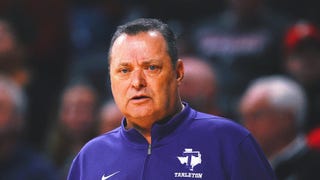Fans of the Los Angeles Dodgers applauded as the team was sold for $2 billion, and cheered with each expensive new addition.
Now the bill is coming due. And guess who is going to pay the price?
Actually, you don't need to guess. The way baseball finds ways to separate fans from their money knows no bounds.
New stadiums funded by taxpayers are pretty much standard across the country. So are $11 beers and $15 sandwiches for those who can afford the price of a ticket at the ballpark to begin with.
But now teams are finding ways to reach deep in the pockets of those who wouldn't know Clayton Kershaw from Alex Rodriguez. And that could mean more than half of Dodger fans in the Los Angeles area — and countless others living elsewhere — may find themselves unable to watch their favorite team when the season begins later this month.
At the heart of the issue is a new regional sports network that will pay the Dodgers $8.35 billion over the next 25 years. It was created by Time Warner Cable solely to broadcast the team's games, and it's the reason the new owners paid more for the team than any other professional sports franchise ever.
It's nothing new in sports. The YES Network that broadcasts the New York Yankees and Brooklyn Nets is reportedly very profitable, and there has been a proliferation of new networks sprouting up for teams, leagues and even college conferences.
But the networks want to be bundled in packages that everyone gets, not just sports fans. There's a lot more money to be made if every cable or satellite TV subscriber has to pay up.
It's a system that has worked well for ESPN, which gets more than $5 a month from almost everyone who pays a cable or satellite bill. But providers like DirecTV are starting to play hardball in negotiations with the new networks, and that means a lot of Dodger fans could be without their favorite team unless deals are made.
Even if they are, what used to be seen for either free or a small fee will now cost viewers plenty. Baseball has now gotten the pay-per-view it has coveted for so long, and the best part is it's cleverly disguised as just part of your monthly bill.
On an earnings call with analysts last month, DirecTV CEO Mike White called the fee Time Warner is asking for its Dodger Network — various reports put it between $4 and $5 a month — a "staggering increase relative to any other benchmark in Major League Baseball."
For those who can't bear spending the summer without Vin Scully that's probably a fee they're willing to pay. But sports programming is already a big chunk of everyone's cable or satellite bill, and without a la carte pricing everyone pays. That includes people who would much rather spend the evening watching "American Idol" than the Dodgers playing the San Diego Padres.
DirecTV is already charging an additional $3 per month in markets with multiple regional sports networks. White said the Los Angeles market should expect an increase in that surcharge if the satellite provider decides to carry the network.
"These kinds of increases are what drive people to want to see a la carte," he told analysts.
The real problem, though, isn't the business dispute between cable and satellite providers and the new networks. It's the unending greed of Major League Baseball, which continues to sacrifice the good of the game for the money its owners can make from the game.
It's backfired at times, most notably in Houston where the parent company of Comcast SportsNet Houston is in bankruptcy because no other providers thought the hapless Astros were worth buying. But mostly baseball has been able to continue to extract money from both fans and non-fans who don't even realize they're paying.
They do so even while interest in the game is declining. Sure, the die-hard fans remain, but the World Series that used to be regularly watched in more than half of all households was on in just 15 percent of them last year.
The new owners of the Dodgers didn't spend $2 billion thinking they wouldn't be getting in on the gravy train. With one of the premier franchises in sports, it's pretty much a guarantee they will.
What's even more of a guarantee is that you'll end up footing the bill.
____
Tim Dahlberg is a national sports columnist for The Associated Press. Write to him at tdahlberg@ap.org or http://twitter.com/timdahlberg








































